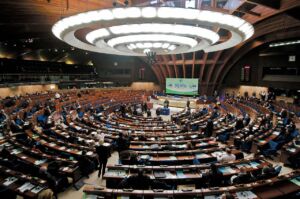Opinion
This Week’s Editorial: Denmark, An International Scarecrow
Ejvind Sandal
This article is more than 9 years old.

One of the committee rooms that Støjberg and Jensen explain themselves in (photo: PPCOE)
On Tuesday this week, the Danish Parliament made L87 part of the nation’s legislation after two months of heated debate played out in front of the entire world’s media and beyond.
Explain themselves
Two of our ministers – Kristian Jensen and Inger Støjberg – were summoned to the EU Parliament Committee for Human Rights to explain just what it is they think they are doing.
The highest degree of attention was paid to the rule that proposes that asylum-seekers should provide for themselves if they can and are only allowed to hold on to means (including jewellery) not in excess of 10,000 kroner. Items of sentimental value, however, are exempt.
Scaring them away?
The media everywhere picked up on this proposal when if was first brought to the table. Even yours truly were interviewed in real time on Al Jazeera.
Government speaker Jakob Ellemann went to the US and was interviewed on CNN about the issue. Although he claimed that Denmark would never in reality confiscate jewellery from refugees, it remained clear that the impression he made was yet another step in a race to the bottom to scare asylum-seekers off.
Race to the bottom
More serious focus will now probably be directed towards the three-year waiting time before family reunification can take place. Strong voices claim that this proposal is in direct violation of the UN convention relating to the status of refugees. The issue could end up in court.
Voices among the government’s supporting majority are now openly questioning the UN convention and are even starting to talk about abandoning or modifying it so that the reception of refugees will no longer be an absolute obligation but a choice made based on the nation’s own individual judgement and ability to cope with the burden. This is not good news for the refugees if it comes to
pass.
The convention may in fact need a service check. Not at the front end, with refugees still at sea, but in the establishment of a distribution system among receiving nations that ensures adequate funding and a fair allocation.
Even before changes to the convention become a real issue, it is now critical that the EU comes up with a solution for the current crisis facing us – before the race to the bottom ends here and now.
About
Ejvind Sandal
Copenhagen Post editor-in-chief Ejvind Sandal has never been afraid to voice his opinion. In 1997 he was fired after a ten-year stint as the chief executive of Politiken for daring to suggest the newspaper merged with Jyllands-Posten. He then joined the J-P board in 2001, finally departing in 2003, the very year it merged with Politiken. He is also a former chairman of the football club Brøndby IF (2000-05) where he memorably refused to give Michael Laudrup a new contract prior to his hasty departure. A practising lawyer until 2014, Sandal is also the former chairman of Vestas Wind Systems and Axcel Industriinvestor. He has been the owner of the Copenhagen Post since 2000.











































